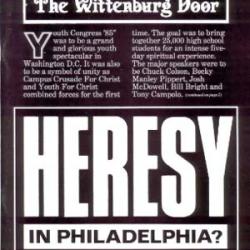At Jesus Creed, RJS shares a nifty video from theologian N.T. Wright. In that video, Wright says:
One day, in God’s new heaven and earth reality, Love is the language that we’ll be speaking, and we get to learn it and practice it in advance. It is like learning the songs that they will sing in God’s new world. We learn them and sing them here because we are supposed to people through whom a taste of the new world comes into the present. And again, if you think that that is just private and not something that goes out into the wider world you’ve missed the whole point. The whole point of love is that it is generous and outgoing. And so for Paul and for the other early Christian writers love is not just, as it were, one virtue among others. Love is almost the name of what it means to be a Christian.
RJS disagrees — but only with Wright’s “almost”:
Love is the name of what it means to be a Christian. No qualifier, no almost. … Love is the name of the game. Love God, love others. This theme runs through the Gospels, it runs through Paul and the other New Testament writers. … This isn’t the soft and wimpy approach, diminishing the gospel, it is the whole game. As God loves us so are we to love others.
The Family Research Council says that Wright and RJS have this all wrong.
Love, FRC says, is just squishy, namby-pamby liberal talk for abandoning absolute truth and biblical authority:
That abandonment of principle is leading to a decline in membership, especially among the more liberal denominations. As more churches move away from biblical authority, their attendance suffers. Just ask the Episcopal Church, whose pews are virtually empty after the decision to endorse homosexuality. It’s time to push back on the spin that’s feeding our weak brethren who say that compromising truth in pursuit of love is the way to reach the lost. Intuitively, people want to anchor their lives to something meaningful — something that demands the sacrifice and discipline of “taking up your cross.” When a denomination abandons the truth and waters everything down to love, it reduces the church to another hour of Dr. Phil — which is something Americans can get without ever leaving home.
Love is not truth, FRC says. It seems, in fact, to be something that erodes truth — the refuge of spineless liberals and Episcopalians intent on “compromising truth” and rejecting “biblical authority.”

What does “biblical authority” mean here? That’s not entirely clear, except that it certainly does not have anything to do with love, no matter what squishy liberals like N.T. Wright, RJS, the Apostle Paul or Jesus Christ might claim otherwise.
More than anything else, it seems, for the Family Research Council, “biblical authority” means rejecting “homosexuality.” By accepting LGBT people, FRC says, the Episcopal Church has abandoned the Bible and thus, now, its “pews are virtually empty.”
Here, then, is the Family Research Council’s church-growth strategy: Be anti-gay, and then be even more anti-gay.
Does this work? Well, FRC’s claim about “empty pews” in the Episcopal Church isn’t really true. As Zinnia Jones notes, that denomination saw its attendance decline by 3.7 percent from 2000-2010.
But perhaps this modest decline only reflects the modesty of the denomination’s “endorsement” of LGBT people. What about a far more liberal denomination, like the Unitarian Universalists, with its far more aggressive embrace of LGBT people?
Aha! The figure for the Unitarian Universalists is 15.8 percent! Their more dramatic pro-gay stance has led to a far more dramatic decline, just as the Family Research Council’s theory predicts that it …
Oh wait. I’m sorry. That 15.8 percent figure for the Unitarian Universalists is how much the denomination grew from 2000-2010.
Let me say that again: The Unitarian Universalists grew by 15.8 percent in 2000-2010.
And that would seem to indicate that FRC’s theory of church growth is pure hooey.
The evidence, in other words, suggests the opposite of what FRC claims. The evidence suggests that Wayne Besen is correct when he says “Gay Bashing by Churches Is Why a New Pew Poll Shows America Losing Its Religion“:
Religious extremists have long claimed that the acceptance of homosexuality would bring down the fundamentalist church — and they have been proven correct, albeit not for the reasons they proffered. The downfall occurred not because gay people stopped heterosexuals from reproducing or recruited their children. It didn’t happen because LGBT individuals hate families, which they have always been part of. And it didn’t happen because homosexuals despised faith; the abundance of deeply religious gay people proves that this is not true.
The fundamentalists undermined their legitimacy by worshiping anti-gay bigotry long after it had been exposed as a false God. In this unholy obsession the sacrifices left bleeding at the altar were truth and justice. When people see their own sons and daughters and friends and co-workers coming out, it creates a crisis of credibility for religious institutions. It leads to countless situations where mean-spirited men like [Twin Cities Catholic Archbishop John] Nienstedt demand blind, irrational obedience and say “take it or leave it” — and more people are now following their consciences and walking away.
And “Why are Americans walking away from religion?” asks Tom Roberts:
“Several leading scholars contend that young adults, in particular, have turned away from organized religion because they perceive it as deeply entangled with conservative politics and do not want to have any association with it,” according to the report.
The researchers cite several studies and quote from a recent book American Grace: How Religion Divides and Unites Us, by Robert Putnam and David Campbell, who argue that in recent decades “[r]eligiosity and conservative politics became increasingly aligned, and abortion and gay rights became emblematic of the emergent culture wars.” Consequently, say Putnam and Campbell, many young Americans came to view religion as “judgmental, homophobic, hypocritical, and too political.”
Zinnia Jones cites one more study confirming all those others:
According to a survey by the Public Religion Research Institute, 69 percent of Millennials believe “religious groups are alienating young people by being too judgmental about gay and lesbian issues”. In other words, people aren’t leaving because their churches are too tolerant of homosexuality. They’re leaving because their churches are too intolerant of homosexuality. The FRC is operating outside of reality, in a world that exists only in their fevered imagination.














